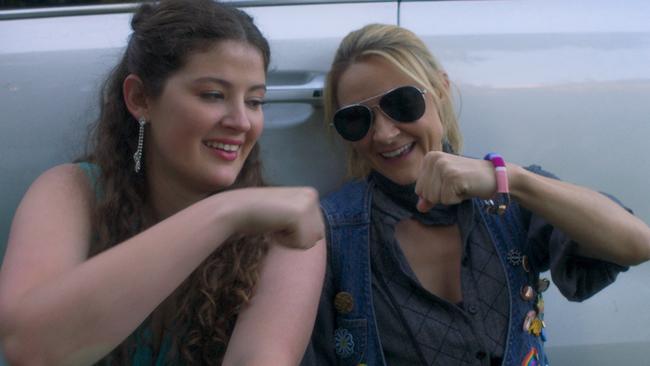Ellie & Abbie (& Ellie’s Dead Aunt); Pinocchio movie reviews
The traumas inherent in coming out as a gay high-schooler are handled with delicacy and humour here.

Ellie & Abbie (& Ellie’s Dead Aunt)
Rated (M)
Four stars
Staggered limited cinema release
The traumas inherent in coming out as a gay high-schooler are handled with delicacy and humour in writer-director Monica Zanetti’s immensely likeable Ellie & Abbie (& Ellie’s Dead Aunt).
Ellie (Sophie Hackshaw) lives with Erica (Marta Dusseldorp), her single mother, and she’s in a quandary. The 17-year-old is attracted to Abbie (Zoe Terakes), a student in her class, but she doesn’t know how to approach her. What if Abbie is straight? How embarrassing would that be? Erica isn’t much help; when Ellie drops the bombshell about her sexuality, Erica’s can’t hide her disappointment, which chiefly revolves around the fear of never being a grandmother (“You’re such a bigot,” her daughter tells her).
But fortunately, Ellie has a friend who is willing to give her practical advice and even a useful list of conversation starters. The only trouble is that the friend, Tara (Julia Billington), her mother’s sister, died before Ellie was born. She appears to her niece as a cheerful and articulate ghost, but no one else can see or hear her.
The film is distinguished by a skilfully written screenplay and by uniformly excellent performances. The scenes in which Ellie and Abbie cautiously explore the possibilities of a relationship are handled with the insight that comes with experience, and both the young actors are superb. Excellent, too, is Dusseldorp as the troubled but supportive mother, Billington as the forthright, chatty ghost, and Rachel House as Patty, Erica’s best friend and once Tara’s lover.
The revelation of the circumstances of Tara’s death, back in 1989, are genuinely touching and imbue the film with a tough core and a reminder as to how society’s attitudes to sexuality have changed.
This disarming film belies its obviously small budget and from the very start it looks terrific. The colourfully designed opening credit titles are delightful and the cinematography by Calum Stewart, is first-class. Though for the most part the mood is light there are darker undercurrents to remind the viewer that, for a gay teenager, life is not a bed of roses.
I mentioned the beautifully designed opening credit titles, and I was intrigued to see that, in the frame containing the name of the writer-director, there is a quote from Marie Curie: “Nothing in life is to be found. It is only to be understood.” It’s an apt quote to introduce a generous and engaging movie.
-
Pinocchio
Rated (M)
Four stars
Limited cinema release
It has often been noted how cruel and grim some of the most enduring fairytales can be. Snow White, Hansel and Gretel, Little Red Riding Hood – timeless stories like these are structured around threats and even horrors perpetrated by wicked adults towards children and young people, but of course the children have always prevailed, which makes it all acceptable. Pinocchio, the most famous Italian story for children, was written in 1883 by Carlo Collodi and the story is pretty dark, although it contains a powerful message about behaving well and honouring your elders.
The Walt Disney film of the book, made in 1940, made light of some of the more sinister aspects of the story. The Fox and the Cat, according to Disney, were comical villains, although when Pinocchio is swallowed whole by a giant whale, children around the world were terrified.

Disney’s film remains the most celebrated screen adaptation of Collodi’s book, but there have been several others including, in 2002, a version directed by Roberto Benigni, the Italian comedian who had enjoyed an international success five years earlier with Life is Beautiful.
Benigni’s antics at the Oscar ceremony in 1998, when he won Best Actor and Best Foreign Film, are still fondly remembered. But Benigni’s Pinocchio was far from successful, possibly because he elected to play the title role himself and he looked incongruous as a small boy.
In the new version, Benigni is far more successfully cast as Geppetto, the carpenter who carves Pinocchio out of a piece of wood. The character’s delight when he discovers that the puppet he has created can walk and talk, without strings, is beautifully performed by the actor. Pinocchio is played by eight-year-old Federico Ielapi, whose expressive face and mischievous manner make him perfect for the role.
The new Pinocchio is directed by Matteo Garrone, who wrote the screenplay in collaboration with Massimo Ceccerini, who plays the role of the Fox. It follows the book quite closely, while slightly playing down the more sinister elements of the story. Geppetto’s poverty-stricken, lonely existence is touchingly established, making the arrival of a ‘son’ a matter of great rejoicing. But Pinocchio is a naughty, disobedient boy, forever getting into trouble, and bringing much grief to his father. Geppetto literally sells the coat off his back to purchase a schoolbook for the boy. But instead of going to school, Pinocchio wanders off and sells the book so that he can gain entrance to the travelling puppet show run by Mangiafuoco (Gigi Proietti).
This is just the first of the many encounters and adventures experienced by the rascally puppet. The Fox and the Cat (Rocco Papaleo) are scruffy deadbeats who easily cheat him and leave him for dead. His feet are burned when he sits too close to a fire. He is nearly hanged. But he receives help from a beautiful Fairy (played by Alida Baldari Calabria in the early scenes and by Marine Vacth in the later ones) whose guardian is a Snail (a wonderfully inventive character, played by Maria Pia Timo).
There is only one scene in which Pinocchio’s lies, to the Fairy, are punished by his nose growing to an enormous length, and the scene is played for comedy as a bunch of woodpeckers alight on his proboscis and begin to peck at it.
If you’ve only ever seen Garrone’s grim films about urban crime (Gomorrah, 2008, about the Neapolitan Mafia, and Dogman, 2018) you might think that this elaborately staged fairytale is a curious departure, but Garrone has made other fantasies, including Il racconto dei racconti/Tale of Tales (2015), so the genre isn’t new to him.
Above all the film is extremely beautiful. The photography, sets, costumes and makeup are all magnificent. Special mention should be made of the exceptional work of makeup artist Mark Coulier (who was responsible for transforming Steve Coogan and John C. Reilly into Laurel and Hardy). Some of the characters, especially that of an ape-like Judge (Teco Cello), who metes out punishment to the innocent with careless nonchalance, are splendidly imaginative creations. Disney’s “conscience”, Jiminy Cricket, is here just named Cricket (Davide Marotta), and he’s a tiny creature whose wise advice Pinocchio largely ignores. The film’s depiction of school is, however, so grim as to make it easier to understand why the kids play truant – and wind up the prisoners of an evil man who turns them into donkeys. The schoolteacher regularly beats and humiliates the children in his class, but this behaviour is accepted as normal.
Ultimately, the moral is made clear: if you behave well and respect your father you will be rewarded. Meanwhile, the adventures of Pinocchio will continue to entrance children of all ages.
Incidentally, the Disney company is continuing with its policy of remaking its celebrated animated features into live-action movies. There is on the cards yet another version of Pinocchio, to be directed by Guillermo del Toro. Until that one comes along, Garrone’s version, though a touch on the lengthy side, is a handsome, inventive and extremely satisfying version of the famous story.




To join the conversation, please log in. Don't have an account? Register
Join the conversation, you are commenting as Logout